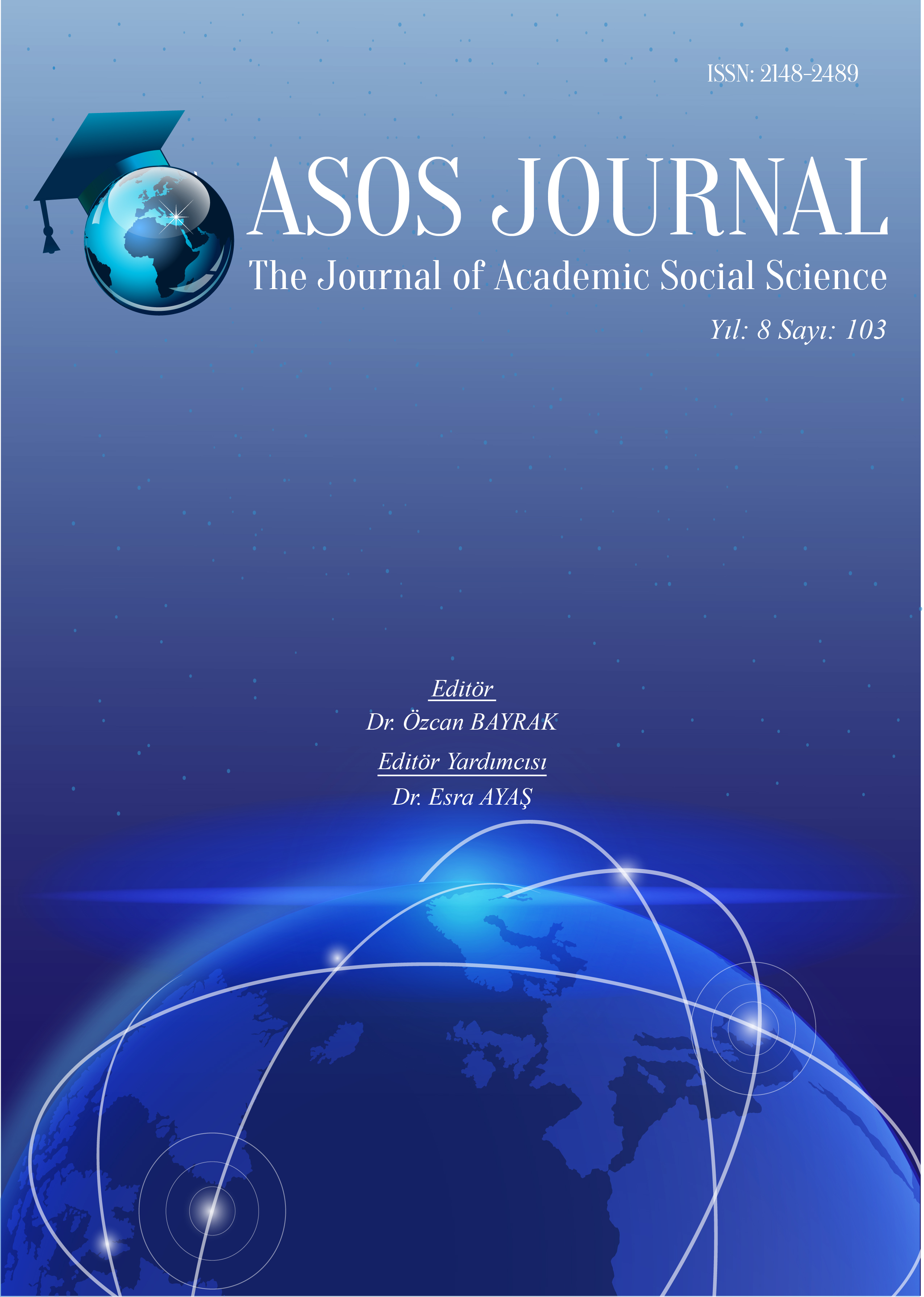Author :
Abstract
18. yüzyıl Fransız Aydınlanmasının ardından değişen toplumsal düzenin etkileri, 19. yüzyılda diğer birçok alanda olduğu gibi opera sanatında da hissedilir. Burjuva sınıfının kapitalist ekonomik ilişkiler sayesinde yükselmesi ve edindiği sosyal gücün doğallaştırılması, burjuvaziye, aristokrasinin sahip olduğuna benzer bir saygınlık verir. Yazıldıkları dönemin siyasi, kültürel, ekonomik görünüşünü yansıtması açısından önem arz eden sanatlardan biri olan opera söz konusu olduğunda burjuvazi, asillerin bu sanat dalını elit olarak tanımlamasına karşı çıkmaz, ancak görünümünü değiştirmeye yatırım yapar (Kehler,1994: 42). Birçok operaya konu olan Shakespeare oyunlarının ve opera sanatının, burjuvazinin yakın geçmişini gözler önüne serme konusunda birbirine benzer işlevleri olduğunu söylemek mümkündür. Bu makalede, Giuseppe Verdi ve libretto yazarı Arrigo Boito’nun, W. Shakespeare’in aynı adlı oyunundan opera sahnesine uyarladığı Otello başlıklı eserde burjuva sınıfının temsili ele alınacaktır.
Keywords
Abstract
The effects of the transformation of the social order following the 18th century French Enlightenment, is felt in the art of opera as in many other fields. The rise of the bourgeoisie and the habitualization of its social power procures a respectability similar to that possessed by the aristocracy. When it comes to the opera, one of the arts that reflects the political, cultural and economic aspects of its time, the bourgeoisie does not object to the definition of this art form by the nobility as elite. However, it invests in changing its appearance (Kehler, 1994: 42). It is possible to emit that Shakespeare’s plays – which have been the subject of many operas - and the art of opera have similar functions in displaying the recent history of the bourgeoisie. This article evaluates the representation of the bourgeoisie in Otello, W. Shakespeare’s homonymous play adapted to the opera by Giuseppe Verdi and the libretto writer Arrigo Boito.
Keywords
- Bini, D. (2006). Reticence, a rhetorical strategy in Othello/Otello: Shakespeare, Verdi-Boito, Zeffirelli. Italica, Vol. 83, No. 2, 238-255
- Dean, W. (1992). Shakespeare and opera by Gary Schmidgall review. Music & Letters, Vol. 73, No. 1, 120-121
- Fairtile, L. B. (2013). Verdi at 200: recent scholarship on the composer and his works. Notes, Vol. 70, No. 1, 9-36
- Finkelstein, S. (1995). Besteci ve ulus (müzikte halk mirası) (M. H. Spatar, çev.). İstanbul: Pen- cere Yayınları.
- Gherman, A. M. (2005-2006). Music and literatüre impressions and notes of an inveterate mu- sic-lover. Philobiblon Transylvanian Journal of Multidisciplinary Research in Humanities X-XII
- Greenblatt, S. (2001). Shakespeare ve kültür birikimi (N. Pelit, çev.). Ankara: Dost Kitabevi Yayınları.
- Grim, W. E. (1994). Shakespeare and opera by Gary Schmidgall review. Comparative Drama, Vol. 28, No. 3, Music and Drama, 403-404
- Hauser, A. (1995). Sanatın toplumsal tarihi (Y. Gölönü, çev.). İstanbul: Remzi kitabevi.
- Hobsbawn, E. (2008). Devrim çağı -1789-1848 (B. S. Şener, çev.). Ankara: Dost kitabevi
- Kehler, G. (1994). Otello, romanticism and bourgeois ideology. The Wordsworth Circle, Vol. 25, No. 1, 41-45
- Kerman, J. (1953). Verdi's "Otello," or Shakespeare explained. The Hudson Review, Vol. 6, No. 2, 266-277
- Kocaoğlu, C. (2019). Philip Glass ‘Dava’ örneğinde 20. yüzyılda opera- edebiyat ilişkisi. Ya- yınlanmamış yüksek lisans uygulama raporu, Dokuz Eylül Üniversitesi, İzmir.
- Meriggi, M. (2015). 19. yüzyıl Avrupası’nda burjuva toplumu. J. Kocka, A. Mitchell (Yay. Haz.). (U. Kocabaşoğlu, çev.). İtalyan “borghesia” sı (s. 409-422). İstanbul: İletişim Yayıncılık.
- Mosse, W. (2015). 19. yüzyıl Avrupası’nda burjuva toplumu. J. Kocka, A. Mitchell (Yay. Haz.). (U. Kocabaşoğlu, çev.). 19. yüzyıl Avrupası’nda soyluluk ve burjuvazi: karşılaştırmalı bir bakış (s. 75-106). İstanbul: İletişim Yayıncılık.
- Öztürk, A. S. (2006). Othello bağlamında insan: politikada insanın değeri. Sosyal Bilimler Ens- titüsü Dergisi, sayı 21, 441-451.
- Wells, S. (1995). Shakespeare yazar ve eserleri. (C. Sevgen, çev.). İstanbul: Yapı Kredi Yayın- ları.
- https://www.operanews.com/Opera_News_Magazine/2012/10/Departments/Live_in_HD_Otell o.html adresinden erişildi. (E.T. 27.01.2020)
- Fotoğraf 2: https://www.whatsonstage.com/london-theatre/reviews/review-otello-royal-opera- house_43935.html adresinden erişildi. (E.T. 27.01.2020)
- Fotoğraf 3: https://www.nytimes.com/2015/09/23/arts/music/review-metropolitan-operas-new- otello-bold-and-tentative.html adresinden erişildi. (E.T. 27.01.2020)





